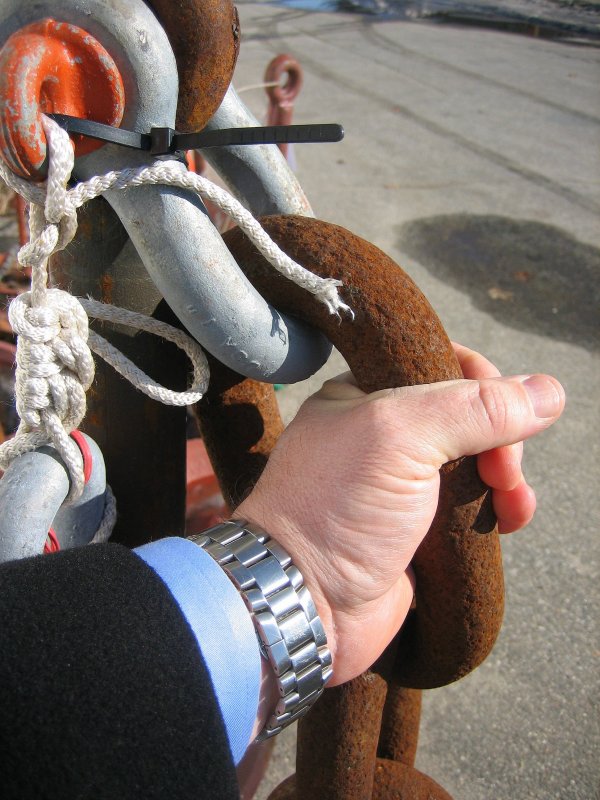I'm surprised at the 1/2 inch bottom chain requirement in Falmouth. Down this way bottom chains are usually 1 inch or 3/4 inch at a minimum. Also is there a requirement on chain length and pendant size and length? Down here the bottom chain is required to be 1x depth of the water and the top chain is usually also 1x. Then the pendants are required to be a certain diameter and a length of 1.5x the water depth. The weight/design of the mooring itself is only one part of the design of the mooring.
Keep in mind that 1/2" chain is the absolute bare minimum size chain that can be used in the mooring field even for a 10' dinghy mooring or a 13' Boston Whaler. Even my little Maritime Skiff work boat uses 3/4" bottom chain & 5/8" top... I also mentioned that Falmouth has many holes and issues and the regs are not perfect yet but still better than 98% of the regs I've studied and read.
Some of the major issues;
#1 Chain Size - Both bottom and top chain are not specified for minimums as related to mooring and boat size. By the letter of the law a mooring installer could use 1/2" chain for a 50' boat and still be "in compliance". I don't know any that do.
This is the bottom chain for our "non-storm" mooring in Falmouth for a 36' boat.....
#2 Scope - There are minimum scope requirements but the town ordinacne does not list them. It needs to be listed.
#3 Inspection & Re-chains - In Falmouth moorings are allowed to be "un-set" for inspections and re-chaining. This is about as dumb as it gets and can be very dangerous with "settable" moorings.. It can take a setting mooring, like a mushroom, six months to over a year to become
properly set in Falmouth. Every time you un-set the mooring the risk of a dragging increases massively. In the last storm, Hurricane force winds just last week, one boat brought all its gear in with it despite the mushroom being over-sized to the town ordinance. Why? It was re-chained in August and had not yet had a chance to re-set. My brothers mooring is 4' below the surface of the bottom and did not budge an inch. He uses a diver tore-chain and inspect. In this case a granite block, pyramid or screw would have been a far better performer due to the un-setting to re-chain the owners over-sized mushroom.. Like my brother I pay the mooring guy to dive on it for inspection to the tune of about $300.00 more than a typical inspection or re-chain.
#4 Dual pendants are not specified or required. The vast majoprity of boats that break free in Falmouth, over 95% at my last count, have only one mooring pendant.
#5 No mooring diagram is shown.
#6 Chafe gear is not required even during storms.
#7 The removal of anchors from bows during storms is not required though an email does go out before each storm.
#8 Type and quality of shackles, swivels & chain are not specified to meet any sort of industry testing. Even a bottom of the barrel Chinese cast shackle is allowed.
These are just
some of the changes that would make Falmouth safer...
We are fortunate enough to have a storm mooring in front of our house, on top of our Falmouth moorings around the point. The storm mooring is in a fairly protected cove with only three or four other small skiffs all spread out.. Our granite block is approx 14" thick, 8' long and 6' wide. It weighs approx 9500 pounds. It is long, low and flat and has settled over 18" into the bottom so that only the 2"
staple is showing. To change the massive USCG/USN bottom chain, once every 20 years or so, requires diving. Two years ago we tried to inspect the bottom of the staple but after two hours the largest mooring barge in the bay could not get it out of the mud. Even with an incoming tide as force the barge was just standing on end...
For bottom chain we use 30' of USCG/US Navy surplus
stud-link bottom chain. Each link is 10" long and it weighs approx 27 pounds per foot. For top chain we use 1" Acco long-link mooring chain & then onto a 1.5" Campbell eye to eye swivel. From there we have two Yale Polydyne 1" pendants, of unequal lengths, which are then connected to two 1" Dyneema storm pendants and one 1" Polydyne storm pendant. For chafe gear I use Chafe Pro... The cleats on our boat are backed by massive 1/2" thick G-10 backing plates.
Our regular mooring, around the point in Falmouth Foreside, is still pretty robust, especially for our boats size. It is likely more robust than perhaps 98% of the moorings in the US, but you could not pay me to keep our boat on it during a
real storm.
This article may be of interest to some:
Mooring Preparation & Precaution For Storms (LINK)

